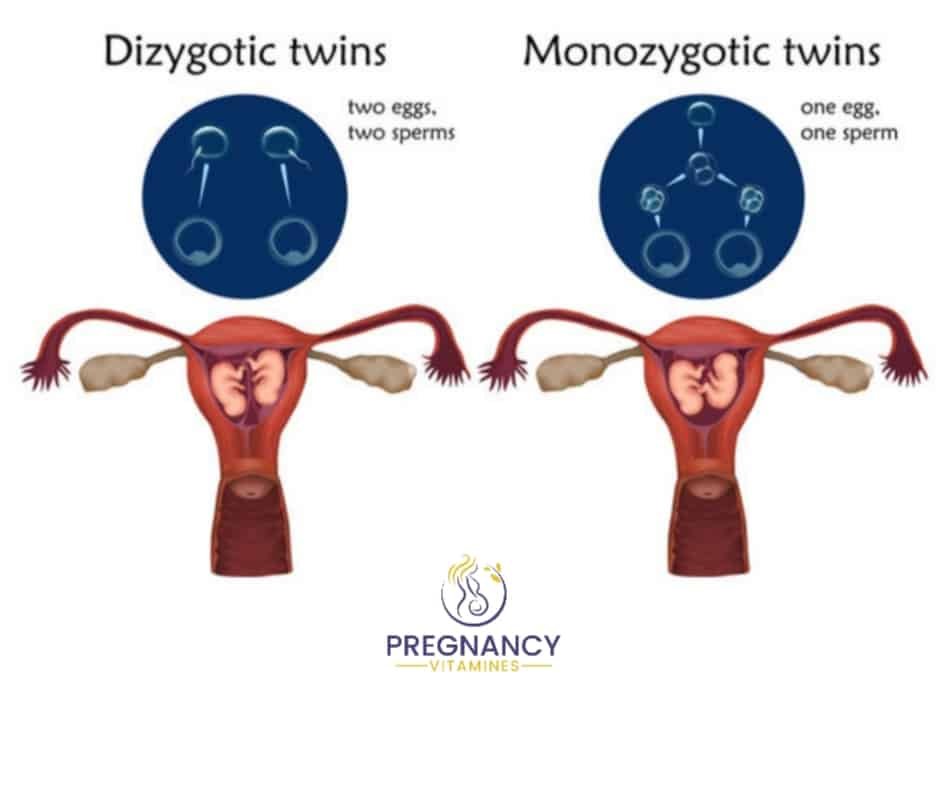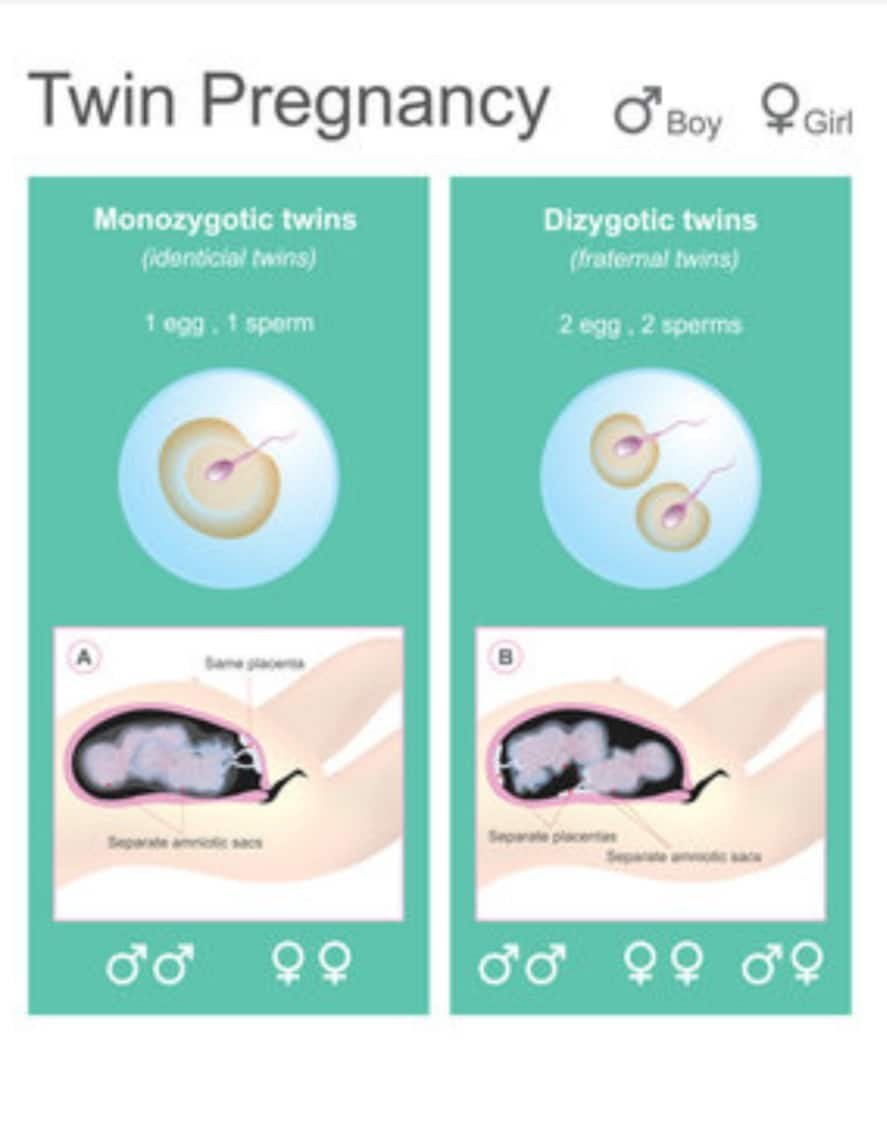Now are days, multiple pregnancies are becoming more common than before as more women are using fertility remedies and getting pregnant at a much older age.
Women with multiple pregnancies are more likely to face complications such as premature birth, and fetal growth restriction with multiple pregnancies.
What the meaning of multiple pregnancies?
Multiple pregnancies are when you are pregnant with two or more babies. When you are pregnant with three or more babies, that means you’re pregnant with higher-order multiples.
How common are multiple births?
Multiple births have become extra common in recent years because more people are now using fertility drugs and treatments, such as IVF, to help produce a baby.
What causes multiple pregnancies? Or How do multiple pregnancies occur?

Basically, there are two major means that multiple pregnancies can occur:
- One fertilized egg (ovum) splits before it embeds into the uterine lining.
- Two or more independent eggs are fertilized by new sperm at the same time.
These two various categories of multiple pregnancies can result in either identical or fraternal siblings.
Twins are named identical when 1 fertilized egg divides into two. Identical twins look exactly alike and share the same genes. Twins are fraternal when two different eggs are fertilized by two separate sperm. Fraternal twins don’t share the exact same genes.
You are more likely to carry twins if non-identical twins run on the family of the mother’s side. Fathers can also carry the gene and pass it to their daughters.
You also have more potential to deliver multiple babies if you got pregnant using IVF. Women in their 30s to 40s are more likely to get pregnant with twins because they are more liable to release more than 1 egg during ovulation.
Terms used for the number of offspring in multiple births
If the number is higher than three, it will end with the suffix -(a/u) plet:
- Two offspring – twins
- Three offspring – triplets
- Four offspring – quadruplets
- Five offspring – quintuplets
- Six offspring – sextuplets
- Seven offspring – septuplets
- Eight offspring – octuplets
- Nine offspring – nonuplets
- Ten offspring – decaplets
How will I find out if I’m having multiple babies?
It’s usually possible to find out if you’re having twins at your first ultrasound scan usually in the first trimester (the first 12 weeks). This is part of your antenatal care at around 11 to 14 weeks of pregnancy. if you were having IVF, You may already know that you are having multiple babies.
What are the signs of multiple pregnancies?
The best way to know if you’re pregnant with two or more babies during your pregnancy is through an ultrasound exam with your healthcare provider. During this experience, your provider can look at images of the inner of your uterus and verify how many babies are in there.
You may be pregnant with more than one baby if:
- You gain weight rapidly in the first trimester of pregnancy.
- Your breasts are sore and very tender.
- You have high amounts of the protein alpha-fetoprotein in your blood.
- The uterus is bigger than expected.
- You feel activity in various aspects of your belly at the same time.
- You have severe vomiting and nausea (morning sickness).
Apart from an ultrasound, Your health care provider might suspect multiples, if there’s more than one heartbeat detected during a fetal Doppler scan.
If you are delivering multiple babies, you will have to see your doctor more frequently than women who are anticipating one baby.

How are multiple pregnancies diagnosed?
The healthcare provider may deduce multiple fetuses in first stage of pregnancy thorough physical exam, health history, and the following tests:
1. Alpha-fetoprotein:
Levels of a protein discharged by the fetal liver and found in the mother’s blood may be high when more than one fetus is generating the protein.
2. Ultrasound:
This is one of the most effective and popular ways to know. This is an imaging test that utilizes high-frequency sound waves to create images of blood vessels, organs, and tissues. Ultrasounds can be performed with a vaginal transducer, particularly in early pregnancy, Or they can be conducted with an abdominal transducer in later pregnancy.
3. Pregnancy blood testing:
Degrees of human chorionic gonadotropin (hCG) may be high due to multiple pregnancies.
What are the difficulties associated with multiple pregnancies?
If you are carrying multiple babies, there are some complications to be mindful of. Some of which might affect the baby.
1. Preterm labour:
This is the labour that occurs too early, before 37 weeks of pregnancy. Preterm labour can lead to premature delivery (birth before 37 weeks of pregnancy).
2. Anaemia
If you are delivering more than 1 baby, you are at greater risk of developing anaemia.
You may have anaemia if your body isn’t receiving sufficient iron. A condition named iron-deficiency anaemia is popular in multiple pregnancies and can enhance your possibilities of premature birth.
3. Gestational diabetes:
This is a kind of diabetes that just pregnant women can get. If untreated, it can result in serious health issues for you and your babies. Diabetes is when you have too much intake of sugar in your blood. Use our gestational diabetes diet calc for free to check your status.
4. Complications in labour
You may be more likely to be assigned an induction (process to bring on labour). But don’t freak out, your midwives and doctors are trained to handle these situations.
5. Polyhydramnios.
This is when you have much amniotic fluid. Amniotic fluid is the fluid that encloses your baby in your uterus (womb).
How can multiple pregnancies affect your babies’ health?
your babies are more likely to face this health complication:
1. Premature birth:
Most time, twins and triplets are born prematurely. This can occur spontaneously (on its own). According to a study, 60% of twin pregnancies and 75% of the triplet are born prematurely.
Premature babies (born before 37 weeks of pregnancy) may have supplementary health issues or need to stay in the hospital longer than babies born to do, so as to taken care of in the hospital.
2. May have problems with growth
If you’re giving birth to twins or more, this enhances the chance of the placenta not operating as well as it should. This can make an impact on babies’ growth and development.
Your provider can also use ultrasound to examine your babies’ growth at prenatal care checkups.
3. Twin-to-twin transfusion syndrome (TTTS)
Twins using a placenta (monochorionic pregnancies) also share the same blood supply. In roughly 15 in 100 monochorionic twin pregnancies, the blood flow may be unbalanced.
What this means is that 1 baby receives too much blood and has high blood pressure, while the other baby receives too little blood and has low blood pressure.
